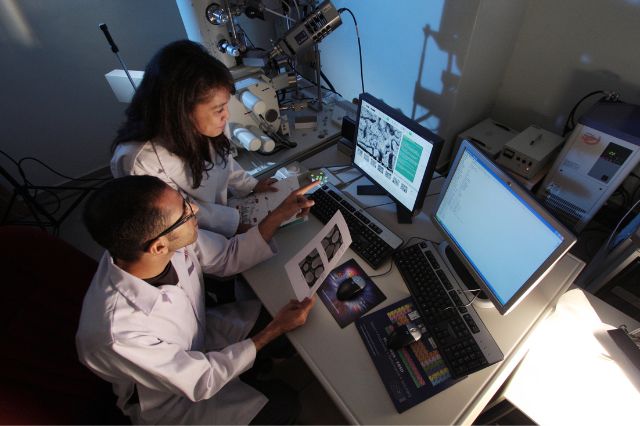Importance of Scientific Education: Why It Matters

Have you ever heard of fake news? What about the myths surrounding specific phenomena? Ideally, everyone has once, twice, or more been told about societal fallacies. A notable example of widespread misconception in the midst of COVID-19 was that intake of hot drinks such as water can eradicate the virus before it reaches the lungs.
In the United States and worldwide, many people fall for this fallacy. However, do you think this was true? According to a 2020 article, “Fallacies and Facts around COVID-19: The Multifaceted Infection,” published in the Journal of Craniofacial Surgery by Elsayed, Shadia Abdelhameed, et al., severe acute respiratory syndrome coronavirus 2 (SARS-CoV-2) has potential to remain virulent at 56O C. From this scientific verdict in human life, what would be your takeaway points?
During the COVID-19 pandemic, you would most likely agree that many people were constantly looking for arguments to promote a particular lifestyle. As such, many people became confused because of conflicting evidence on social media. Fortunately, science education came to society’s rescue by providing consistent evidence on measures of curbing the spread of COVID-19. Other than offering solutions during the COVID-19 pandemic, it’s essential to acknowledge the role of science education in America and globally, especially in supporting every aspect of life.
Importance of Science Education: What You Need to Know
It opens unlimited employment opportunities for students
If someone wakes you up at night and asks why people go to school? What will be your answer? Without a doubt, you’re most likely to say, “To get a job.” Even with the COVID-19 pandemic, let us look at some intriguing statistics from the United States.
According to a 2021 news article titled, “Just 50% of the College Class of 2020 Had Traditional Full-Time Jobs 6 Months after Graduation,” by Hess, Abigail Johnson, more than half of students who completed their bachelor’s degrees from 337 colleges and universities in 2020 got full time employment according to the National Association of Colleges and Universities (NACE). What do these figures tell you? Most people pursue their undergraduate degrees to attain minimum academic qualifications for corporate work.
Out of over 50% of students who got employment in 2020, what percentages accounted for a large proportion? According to a 2022 article titled “Assessing the Lingering Impact of COVID-19 on the Nursing Workforce” by Berlin et al., from 2019 to 2020, the rate of newly registered nursing licenses declined by 3%. These statistics indicate that the US government prioritizes the employment of nurses, considering the role of frontline workers in national development. Therefore, if students prioritize science, technology, engineering, and mathematics (STEM) education, their chances of employment are high.
It provides solutions to real-world problems
Have you ever heard of universal healthcare coverage (UHC)? What does it mean? According to the World Health Organization (WHO), UHC refers to accessibility to medical care at the right time and place without incurring additional out-of-pocket expenses. However, for UHC to be feasible in any country, regardless of its economic status, incorporating evidence-based research findings is necessary.
For instance, before the scientists completed the entire sequencing of the human genome, hospitals depended on Swain insulin to manage type II diabetes. However, in case the symptoms of this disease worsen in Muslim patients, a doctor cannot intervene because of religious principles. According to the article “Beliefs and Daily Lives of Muslims,” it’s unacceptable to consume pork or mid-altering medicines as per Islam dogmas. So, what could be the importance of scientific education in helping Muslims access UHC?
Scientists pursuing STEM degrees such as Bachelor of Science in Biotechnology, Bioinformatics, or Molecular Medicine use the genetic information from the human genome to create analogous human insulin. During this drug development, researchers had to think outside the box. Despite being one example of how science solves a problem of inequality in healthcare, you can also take advantage of a research paper service of high quality to get ideas about projects that can revolutionize the pharmaceutical, agriculture, medicine, construction, or tech industry.
It nurtures the passion for learning
You’ve probably heard a story of how Isaac Newton came up with gravitation in the mid-1960s. In particular, Newton wondered why the apple from the tree neither moved upward nor sideways instead of falling. This intervention led to the following three theories:
- Newton’s Law of Inertia
- Newton’s Law of Acceleration
- Newton’s Law of Action and Reaction
Regardless of the school you’re pursuing your physical or engineering degree, you must have come across these theories. You might have even completed homework on Newton’s laws. Generally speaking, if you love scientific education, you’ll become curious about how things happen in the world.
The Role of Scientific Education in School
It promotes intellectual reasoning and knowledge
If you have a kid and tell her or him to switch on or off the lights, what will be the instructions? Ideally, you’ll just inform the child to press a certain button. So, in this case, what will you have done? Ideally, it’s a form of teaching. However, if you pursue a STEM course, a teacher might give a pupil at the early childhood or college level homework requiring a “how” answer.
For example, a professor might ask their students to write a principle behind the working of a light switch. In this case, the importance of research in education, in this context, concerns explaining mechanisms and processes behind the working of the human body and machines. What is more, through science, you can create visual and tangible evidence for some complicated theories.
It boosts critical thinking
If you hear about scientific education, what comes to your mind? Ideally, many people are most likely to think that it entails science. But, do you know what? Scientific education involves the use of primary or secondary facts to prove or disprove a hypothesis. Notably, scientific education can be applicable to humanities.
When writing a research paper, a student must apply critical thinking. For instance, scientific education teaches learners to use experimental design to support a theory. In other words, you can use historical data to validate the occurrence of a specific problem in contemporary society.
Parting Shot
While everyone attributes technology to a better world, you can’t disregard the application of scientific education in enhancing the quality of life. For instance, for the Internet to bring the library into students’ study rooms, researchers collaborated in developing online databases. In other words, you can say that technology depends on scientific education. While you can enter into a corporate world or entrepreneurship to earn a decent life with a degree in STEM, it’s important to note that your knowledge is vital in bringing balance to academics.





